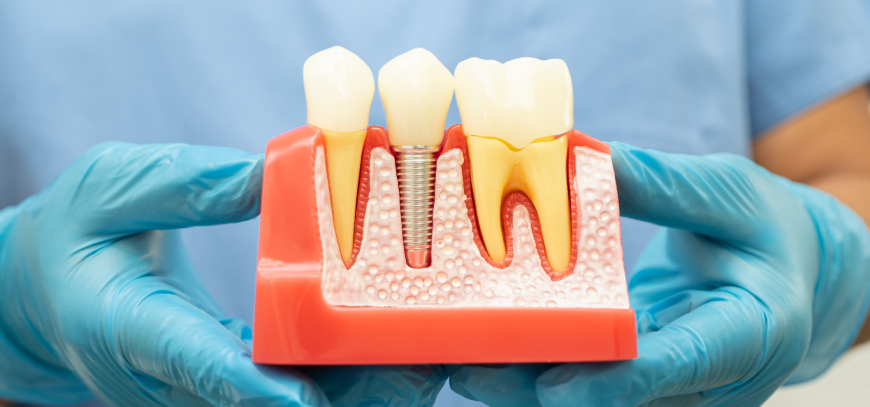Working Time
- Mon-Fri: 9:00 AM – 5:00 PM
Saturday: Closed
Saturday: Closed
Contact Info
-
Phone: 1-888-204-5010
Ask the Experts
Dental Implants

What Are Dental Implants?
Dental implants are artificial tooth roots, typically made from titanium, that are surgically placed into the jawbone beneath the gums. Once in place, they allow dentists to mount replacement teeth, such as crowns, onto them. Because they fuse to the jawbone, dental implants offer stable support for artificial teeth, ensuring that dentures and bridges mounted to the implants won’t slip or shift in the mouth—an especially important benefit during eating and speaking. This fusion process, called osseointegration, helps the implants feel more natural than conventional bridges or dentures. Dental implants can be an option for people who have lost one or more teeth due to injury, periodontal disease, or other reasons.
What Is the Procedure of Dental Implants?
The procedure for getting dental implants typically involves several steps and may span several months, primarily because it allows for healing time between procedures. Here’s a general overview of the dental implant process:
- Initial Consultation: This first step involves a thorough examination of your mouth and teeth, including X-rays or 3D images, and a review of your medical history. The dentist will plan the implant process and may involve specialists such as an oral and maxillofacial surgeon, a periodontist, and a prosthodontist.
- Tooth Extraction: If the tooth to be replaced is still present, it will need to be extracted.
- Jawbone Preparation (Grafting): If your jawbone isn’t thick enough or is too soft, you might need bone grafting before you can have dental implant surgery. This process involves transplanting a piece of bone from another part of your body or using a special bone grafting material to build up the jawbone.
- Abutment Placement: After the implant has bonded with the jawbone, a small connector post called an abutment is placed on top of the dental implant to securely hold the new tooth.
- Impressions: Once the abutment is placed, impressions of your teeth are made, which are used to create the crown, your realistic-looking artificial tooth.
- Crown Placement: The crown, custom-made to match your natural teeth, is attached to the abutment.
The entire process can take many months from start to finish. Much of this time is devoted to healing and waiting for the growth of new bone in your jaw. When properly cared for, dental implants can last a lifetime.
Dental implants have a high success rate, typically above 90-95%, depending on the location in the jaw and adherence to proper care and maintenance. Success rates vary from individual to individual, with factors such as oral hygiene, overall health, and smoking affecting the outcome. Proper planning, execution by an experienced dental professional, and thorough follow-up care are crucial to the long-term success of dental implants.
No, dental implants cannot get cavities because they are made of titanium and the crowns are usually made of ceramic or porcelain, which do not decay like natural teeth. However, it is vital to maintain good oral hygiene to prevent issues like gum disease, which can affect the health of the implant. Regular brushing, flossing, and dental check-ups are essential to maintain the health of the gums and surrounding teeth.
The cost of dental implants can vary widely depending on several factors, including the number of implants, the need for any preparatory procedures like extractions or bone grafts, the geographical location, and the experience of the dental professional. Generally, dental implants are considered a more expensive option compared to other tooth replacement methods like dentures or bridges. However, they are also a more durable, functional, and aesthetically pleasing solution, often making them a worthwhile investment in the long run. It’s best to consult with a dental professional to get an accurate estimate based on your specific situation.